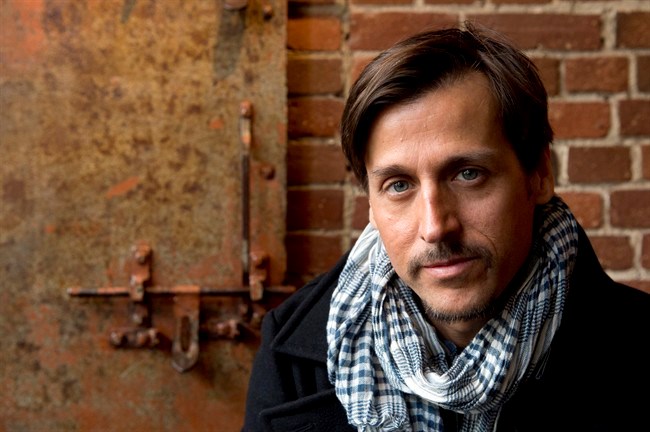TORONTO - Forget charts and graphs. After a couple decades in the music business, Raine Maida has zeroed in on what he considers a foolproof method for measuring success.
"It's the listening test," the laid-back 43-year-old said in a recent interview, relaxing at a Toronto cafe.
"When you sit down and play your music for someone you respect, you get that feeling in your stomach of like: 'Oh my God.' ... You know if it's not great because you start to feel sick."
After ranging up to the peaks of Canadian commercial success as frontman for Our Lady Peace — selling millions of records worldwide and racking up Junos and platinum plaques by the armful — Maida looks at things differently now. And, working on a smaller scale, those instances of stress-induced nausea seem fewer and further between.
On Tuesday, he'll release "We All Get Lighter," his sophomore solo record and first in nearly six years. He's surprised when the lengthy gap between records is pointed out, explaining that he had put the intimate disc together so gradually the years just started to accumulate behind him.
The set is intimate and hushed, with airy, largely acoustic arrangements that Maida says he wanted to be defined by space. He says if there's a thematic thread woven through "We All Get Lighter," it's a message emphasizing living in the moment.
But the politically active Maida included plenty of socially conscious material, too — for instance, the propulsive "S.O.S." opens with a recording of social activist Howard Zinn espousing the value of civil disobedience, while first single "Montreal" finds Maida slyly questioning his claim to such a privileged life.
"Adbusters is my favourite reading material, so as soon as you go there, the synapses start firing in a different way," he said. "You start taking on things that sometimes I feel are out of our control. That's what basically fuels my creative side."
Otherwise, Maida's life is the picture of stability. He and Winnipeg songwriter Chantal Kreviazuk have been married for over 13 years, and the oldest of their three children recently turned nine.
He's asked whether personal upheaval would make his job as a songwriter easier.
"I hardly ever write when I'm just feeling great," he replies thoughtfully. "Maybe I take on that (political) stuff as fuel to write. I do obviously feel passionate about those things, but they definitely are the fire for me that allows me to write."
If a happy relationship doesn't necessarily provide much songwriting fodder, Kreviazuk made her presence felt on the record in other ways.
Many of the songs feature the couple's sweet harmonies, and Maida says he would seize any small window of opportunity to involve his wife in the project.
"I'd literally grab her at 1 in the morning, kids are down, have her sing for 20 minutes, thanks, go back to bed," he recalls. "I think I'll look forward to someday when we can really set aside some time and really collaborate together. It seems like more often we collaborate on things we're writing for someone else, rather than our own stuff.
"At some point that would be fun to do."
Kreviazuk is an in-demand songwriter, and Maida says she has songs on hold for Kanye West, Eminem and Drake.
They often collaborate on such projects, and Maida — who also takes production and songwriting gigs on the side — says they've developed such a trust in each other that they don't need to candy-coat their criticism. It wasn't always so, but he says the couple has gone on retreats together that have helped them hone their communication skills.
"We're pretty brutally honest," he says. "We can be totally honest and it doesn't feel like an attack.... I just love how that's translated to the music side. She can be like, 'That chord progression is not interesting enough.' And I can do the same."
The varied nature of Maine's career suits him, he says. The solo album is not a harbinger of his imminent departure from Our Lady Peace — "I think I get a different audience anyway," he points out — and while that Toronto band has settled into a slightly lower profile than it enjoyed during its commercial peak, Maida is hardly mourning.
"I have to say — 'cause I do work with younger bands and developing bands — being trapped in that space where (charts and sales) matter, it's so destructive. I wish I would have understood that earlier in my career," he says.
"When I look back over my career, there was so much stress. And it was because of the business. It was always because of the business."
Well, it's not as though he hasn't figured out an alternative way to size up his career.
So, did "We All Get Lighter" pass the listening test?
"There's moments on this record where I can really let go and enjoy no matter who's sitting in the room — you know, (even) people who are way cooler than me," he said with a laugh.
"I love that feeling, that security of: 'I'm good with this, and I'm going to be good with this for the rest of my life.' It's a good place. There's moments I know could be better, but even those moments now, I don't feel that pit-of-my-stomach (feeling) anymore.
"I'm much more at ease. I guess it's a confidence thing or maturity. I don't know the right description. But it's a nice feeling to not feel like throwing up when someone's listening."



